Order a callback


Order a call

Order a service
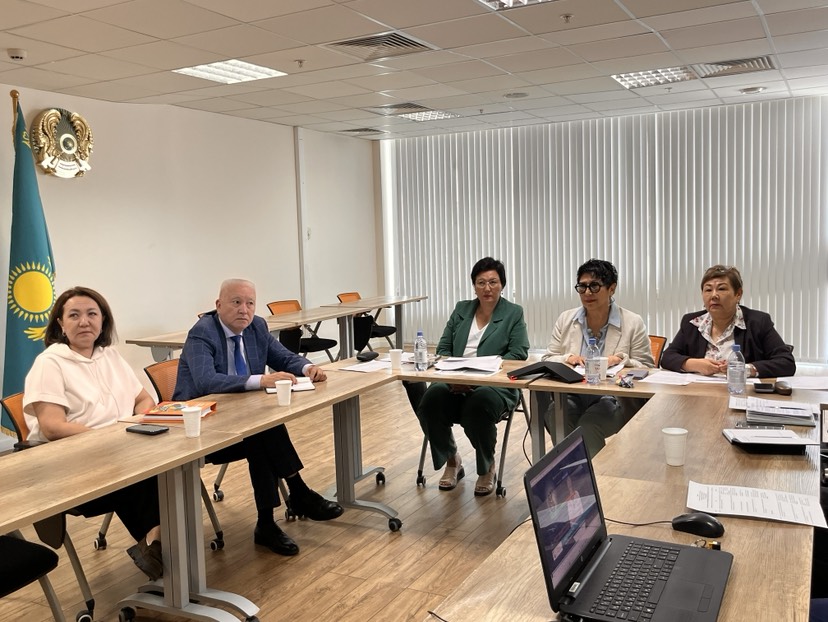
June 27, 2025, the National Structure of the Codex Alimentarius prepared and arranged an International Roundtable on World Food Safety Day in an online mode. The theme of World Food Safety Day is “Science in Action”.
The work of the Codex Alimentarius Commission, with support from FAO and WHO, promotes the coordination of scientific research on food problems, and the Commission itself has become an important international platform for the exchange of scientific information in this field.
For many years, four expert bodies: JECFA, JMPR, JEMRA, JEMNU carry out safety assessments based on the best available scientific information, collected by consolidating contributions from many authoritative sources, and issue publications that are regarded as international reference documents.
The Chairman of the Committee for Sanitary and Epidemiological Control, Chief State Sanitary Doctor of the Ministry of Health Sarkhat Beisenova, representative of the Committee for Veterinary Control and Supervision of the Ministry of Agriculture Saltanat Abylkasymova, the Vice-Chairperson of the Codex Alimentarius Commission Dr. Bitul Vazgecer, representatives of FAO Regional Office for Europe and Central Asia, WHO Country Office, OIE Subregional Office for Central Asia virtually took part in the opening ceremony of the International Round Table.
The Round Table was online attended by representatives of the Eurasian Economic Commission, Belarus, Kyrgyzstan, Tajikistan, representatives of interested ministries and departments, laboratory sanitary and veterinary expertise, academia, universities and international organizations. The participants discussed various aspects of food safety, the importance of an intersectoral approach in addressing key issues, the role of science in strengthening food safety, the importance of Codex Alimentarius documents in ensuring food safety, protecting consumer health and promoting fair trade practices.
Following the Round table, a Resolution was adopted in which the participants noted the special significance of World Food Safety Day in a time of global challenges, the importance of ensuring sustainable interaction in food safety of all participants in the food system on the principles of the One Health approach in order to protect the health of consumers and fair trade. In addition, the need to implement the best world practices in ensuring food safety in the Republic of Kazakhstan, the need to strengthen the role of science, risk assessment and education in ensuring the safety and quality of food products, the importance of raising consumer awareness of their rights to safe and high-quality food products was emphasized.
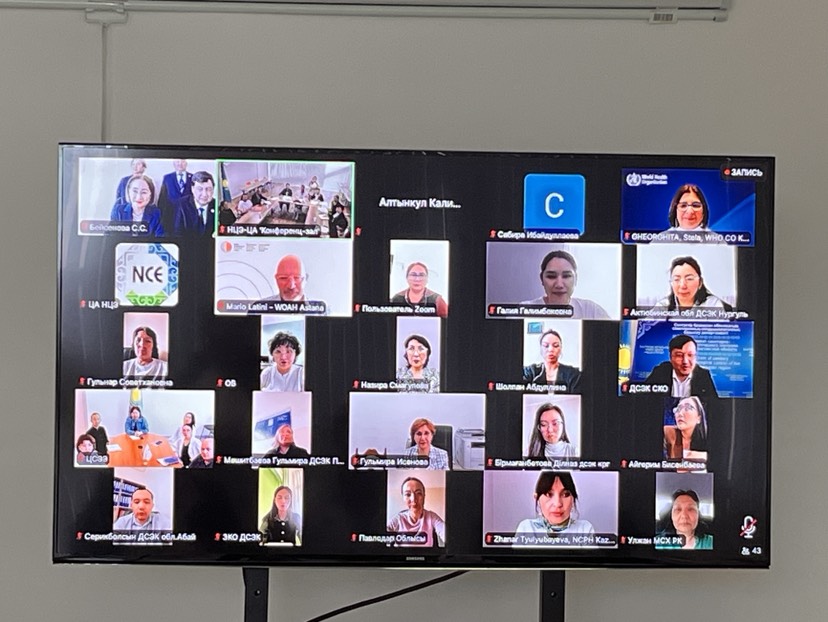

April 23, 2025, the Round table was held on the topic "School meals: implementation of the standard in educational organizations", arranged by the Ministry of Healthcare of RK jointly with the Ministry of Education of RK, and the Kazakh Academy of Nutrition with of the United Nations Children's Fund (UNICEF) country office support.
The heads of the regional departments of healthcare and education of the republic, relevant structures, experts from international organizations as WHO and FAO were invited to the Round table.
Minister of Healthcare of the Republic of Kazakhstan Akmaral Alnazarova, Minister of Education of the Republic of Kazakhstan Gani Beisembayev, President of the Kazakh Academy of Nutrition Almaz Sharman, Deputy Representative of UNICEF in the Republic of Kazakhstan Letizia Bazzi-Vale delivered welcoming speeches.
The Codex Alimentarius National Structure was also invited to the Round Table as experts participating in the FAO project “Contribution to development and further scaling up of healthy nutrition”. As known, the basis of food safety is the scientifically stipulated standards of the Codex. Codex Alimentarius experts provide advice on healthy eating and food safety, which is an integral part of school meals.
February 17-21, 2025, The Codex Alimentarius Group completed an online international training on food safety with the technical support of the German Federal Ministry of Agriculture and Food. The main objective of the training was to provide up-to-date information on residues of veterinary drugs in food, antibacterial resistance and zoonoses management.
The seminar was attended by over 300 participants from countries in the regions of Asia, Africa, Europe, and the Middle East.
Renowned scientists and experts in their fields from the European Union, the USA, Canada, Australia, WHO and FAO headquarters were invited as lecturers.
Topics covered included risk management in the use of veterinary drugs, challenges in laboratory expertise, antimicrobial use in the EU: challenges, goals, priorities, Codex Alimentarius standards for combating AMR, intersectoral collaboration as the basis of the One Health approach, monitoring zoonoses and AMR in the food chain, managing food poisoning outbreaks and many others.
The international training was held at a high level. Participants had the opportunity to receive immediate feedback within the framework of the "Questions and Answers" section.
Karsybekova N.M., Tolysbaeva Zh.T. were awarded the ITS FOOD 2025 Certificate of the Federal Ministry of Agriculture and Food of Germany (President Friedel Kramer).
We look forward to the next international training on food safety in 2026.
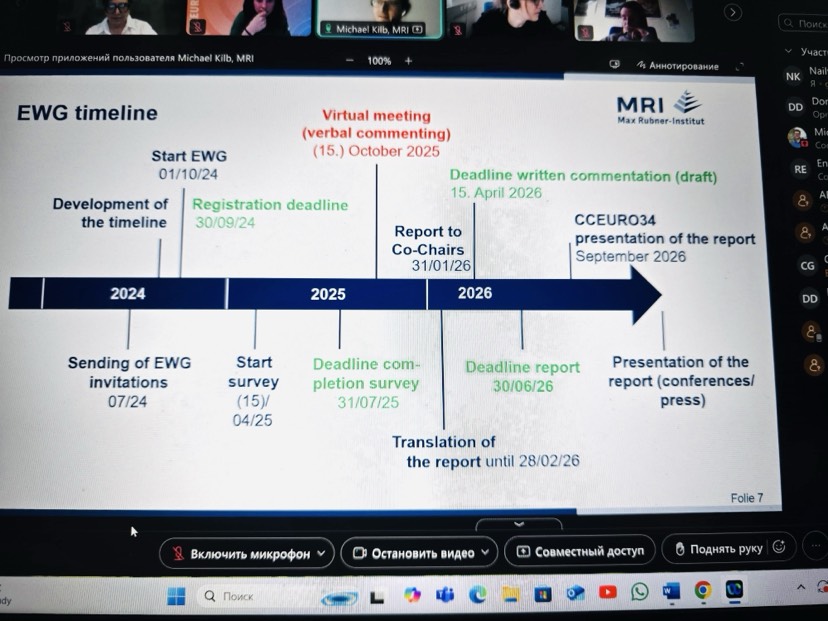
March, 2025, At the 33rd session of the FAO/WHO Coordinating Committee for Europe of the Codex Alimentarius Commission, the member countries of the region by a general decision elected Kazakhstan as the Vice-Chair of the electronic working group, along with Spain and Turkey, to develop food-based nutrition guidelines.
The work of the electronic working group is carried out in an intensive online mode with the active participation of nutrition experts from the FAO and WHO Regional Offices, as well as the UN Children's Fund.
A research project (questionnaire) has been developed, which is designed to take into account all the needs and specific nutritional practices of 52 countries- members of the region.
At the last meeting it was decided to develop a video spot with instructions on how to fill out this questionnaire. Our Turkish colleagues should present a draft of it soon.
The work continues...

At the invitation of the Kazakh Agrotechnical University of Astana, DMN, Professor Nailya Karsybekova presented a lecture for undergraduates of the Food Safety Chair.
Information is provided on the structure of the Codex Commission, goals, objectives, and algorithm for developing Codex standards. Special emphasis was placed on the importance of the country's participation in the standards development process on all codex platforms and profile committee sessions. The lecturer presented the experience of Kazakhstan as Chair of the FAO/WHO Coordinating Committee for Europe. The main results of Kazakhstan's activities as a Regional Coordinator were discussed.
The undergraduates showed great interest in the topic of the lecture. The use of information about the Codex in the thesis of undergraduates is discussed.
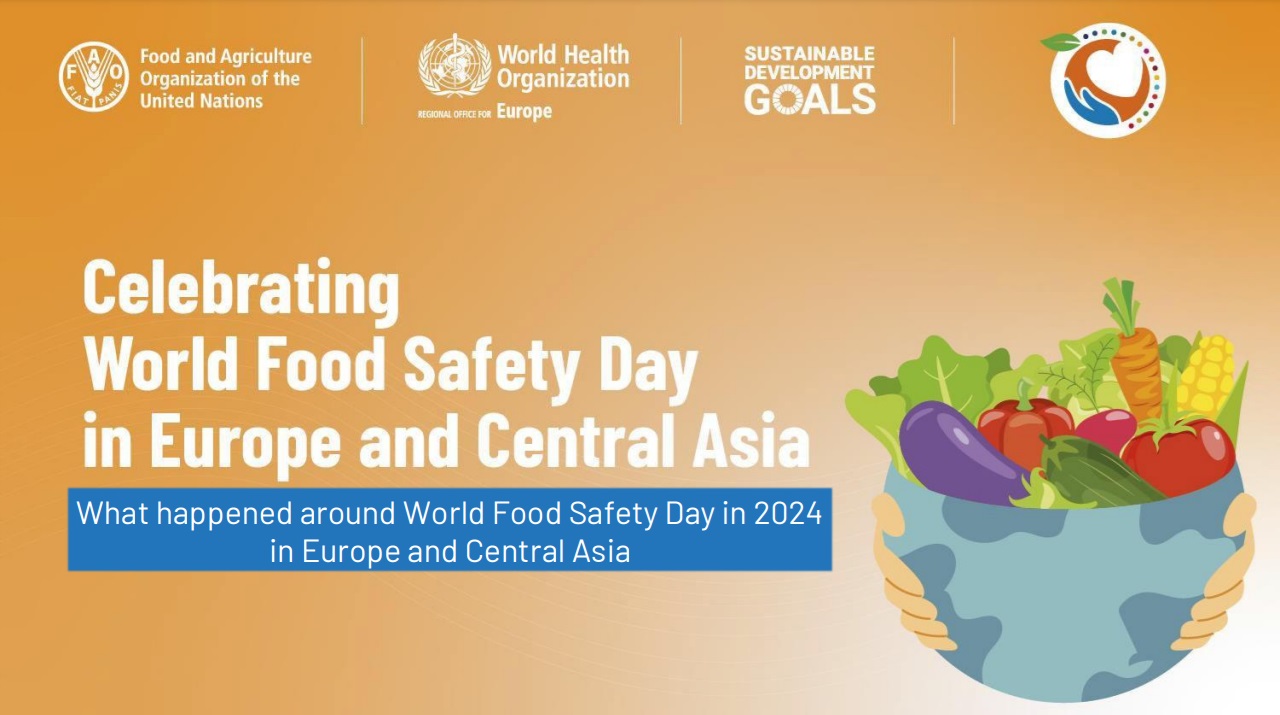
The Food and Agriculture Organization of the United Nations (FAO) website annually publishes a publication entitled “Celebrating World Food Safety Day in Europe and Central Asia.” The publication highlights the events that region countries have held as part of the celebration.
Material on the celebration in Kazakhstan in 2024 is posted on page 12. The National Codex Team held workshops on food safety and Codex Alimentarius throughout the country, training 436 representatives of territorial divisions of the Committee of Sanitary and Epidemical Control of the Ministry of Health of the Republic of Kazakhstan, the Committee of Veterinary Control and Surveillance of the Ministry of Agriculture of the Republic of Kazakhstan, branches of the National center of expertise, entrepreneurs of the food industry and food service.
The publication is available at:
https://openknowledge.fao.org/items/0cf1a7ad-43f6-458e-af25-95ffd26b2988
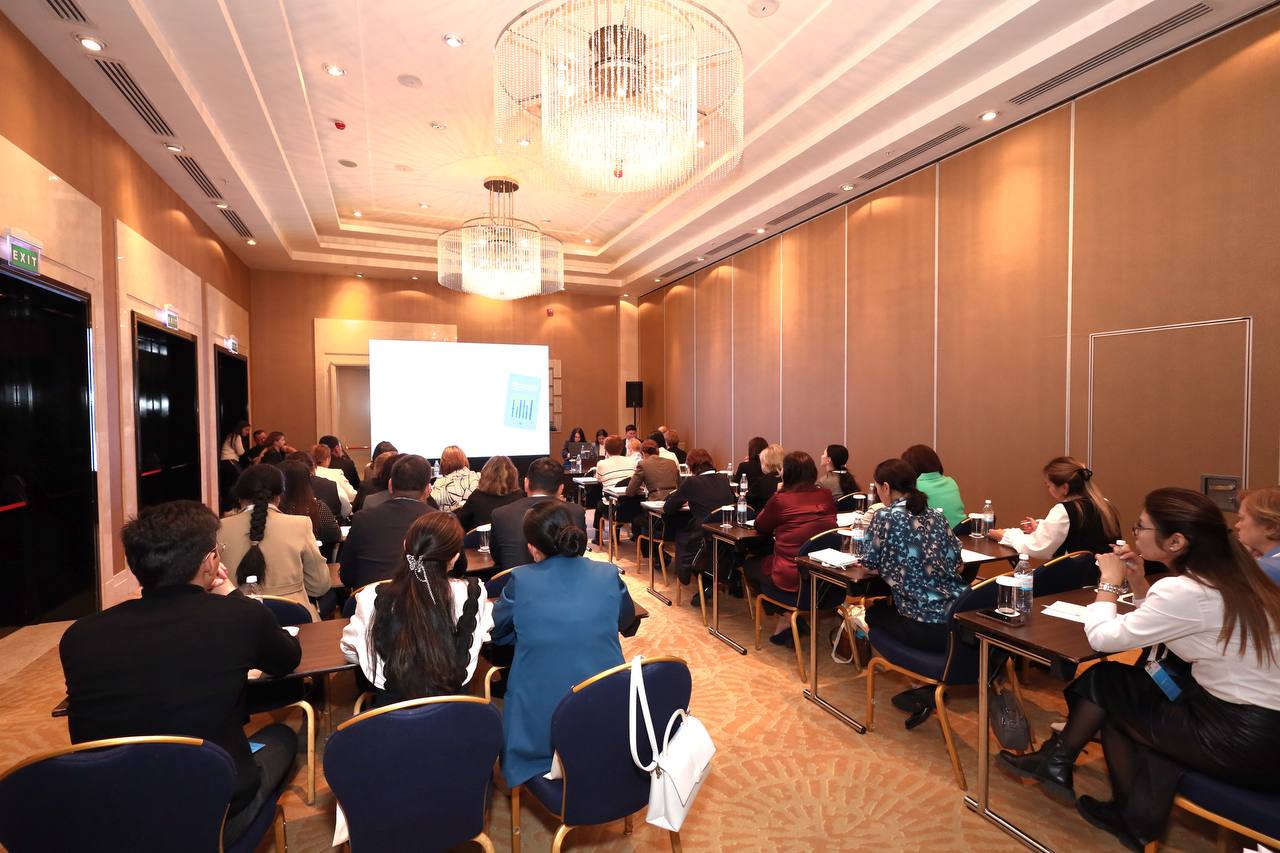
The Codex contact point of Germany would like invite to participate in the 2025 International Training for Safer Food (ITS Food) which targets regulators and will focus on latest developments in the fields of veterinary medicinal products, antimicrobial resistance and zoonoses.
Dates: 17-21 February 2025
Format: Virtual
Languages: English, French, Russian and Spanish
Application Deadline: 15 January 2025
Costs: none
Please visit the following links for further information:
https://www.fao.org/fao-who-codexalimentarius/news-and-events/news-details/en/c/1728860/
https://www.bvl.bund.de/EN/Events/ITS-Food_2025/ITS-Food_2025_node.html
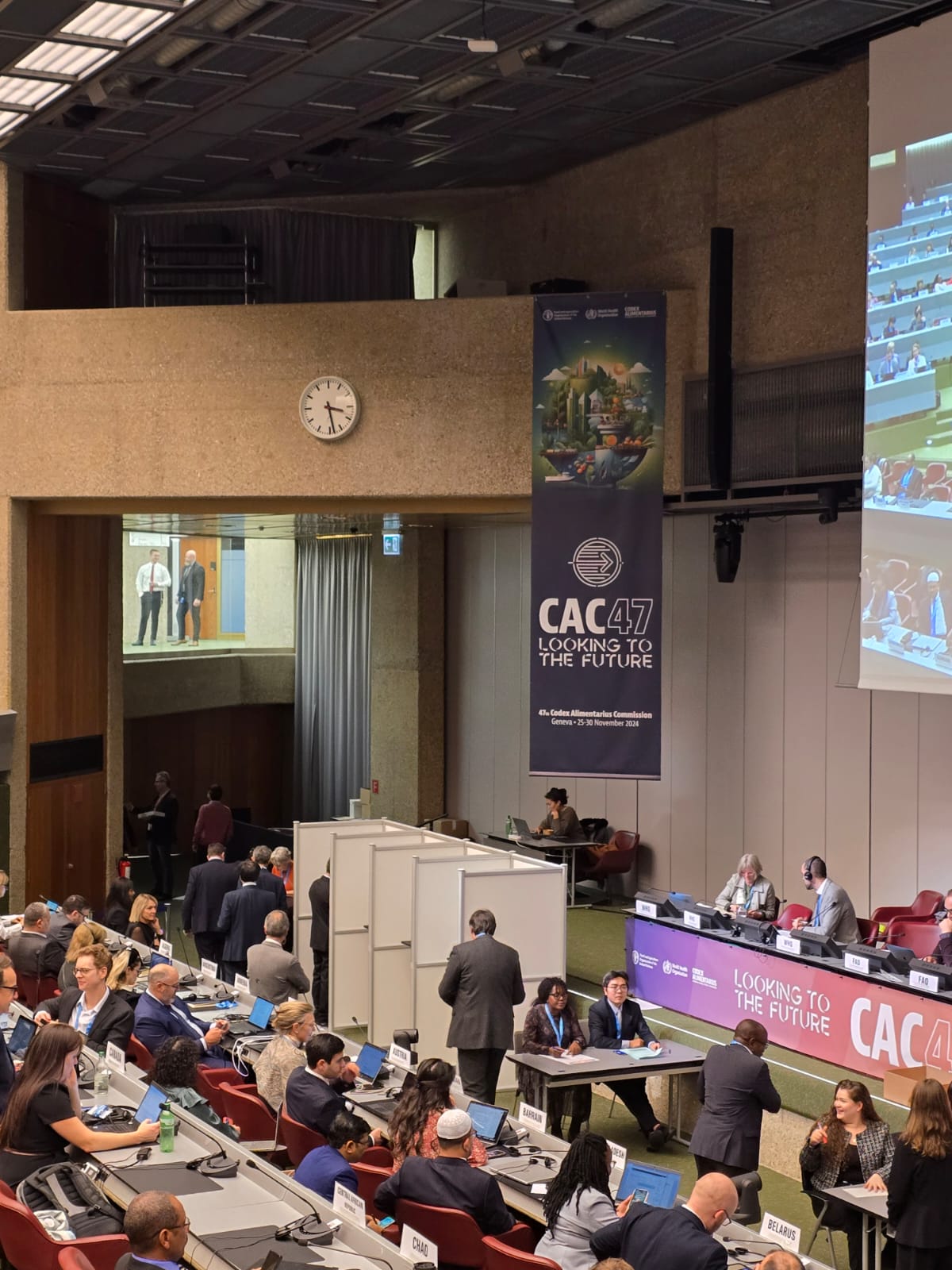
During the session, Dr. Alan Azeghel from Kenya was unanimously elected as the Chairman of the Codex Alimentarius Commission. Six candidates were nominated for three vacancies for the position of Vice-Chairman (Turkey, China, Saudi Arabia, Ecuador, Jordan, and Canada). The elections were held highly competitively, in four rounds and lasted two days - 27 and 28 November 2024. On the first day of the elections, candidates from China and Saudi Arabia were elected, but the remaining four candidates did not receive the required number of votes. Ecuador was eliminated by eliminating candidates who received the fewest votes, and then Jordan in the next ballot. The elections were postponed to the next day, 28 November 2024, due to the late hour. The choice was between a representative of Turkey (European Region) and Canada (North America and Southwest Pacific). In the 4th round, Turkey came out ahead with a margin of 4 votes.
Thus, Alan Azegel (Kenya) was elected as the Chairman of the Codex Alimentarius Commission, the deputies are: Jing Tian (China), Khalid Saud Alzahrani (Saudi Arabia), and Betul Vazgecer (Turkey).
Congratulations to the new composition of the Bureau of the Codex Alimentarius Commission, we wish you productive work for the benefit of the entire Codex family!
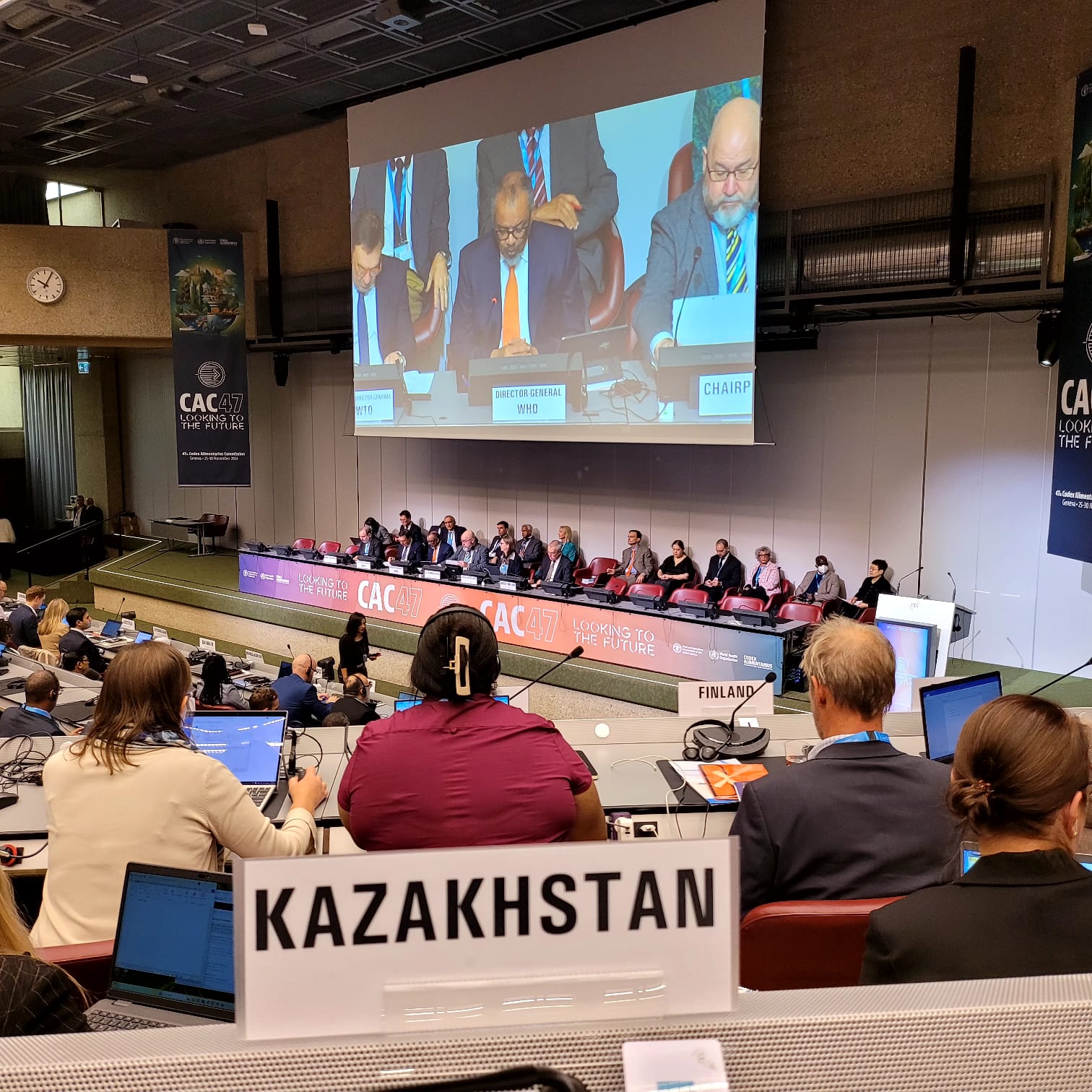
November 25, 2024 The 47th session of the Codex Alimentarius Commission (hereinafter referred to as the Commission) began its work in Geneva. The delegation included the Chairman of the Board of the National Center for Expertise of the KSEC of the Ministry of Health of the Republic of Kazakhstan Yerlan Kiyassov, the national coordinator for Codex Alimentarius issues in Kazakhstan Nailya Karsybekova, and the specialist of the international cooperation department of the department of strategic development and international cooperation of the National Center for Expertise Zhanar Tolysbayeva.
Previously, on November 24, a pre-session meeting of the countries of the European region was held, where a regional position on the issues under consideration within the agenda of the Commission session was discussed and formed.
During the session, delegates discuss standards and guidelines within the framework of the Committees on contaminants, food additives, pesticide residues, veterinary drug residues, methods of analysis, and sampling. For the first time in the Commission's history, joint work is planned between the Committee on Pesticide Residues and the Committee on Veterinary Drug Residues on antimicrobials and pesticides that are used simultaneously as veterinary drugs.
An informal meeting of the countries of the European region and the Middle East was also held, where priority issues for both regions were discussed: standards within the Commission on Fats and Oils (the standard for olive oil in light of the Syrian statement), the Committee on Fresh Vegetables and Fruits (Brix in grape juice), as well as new work initiated by the United Arab Emirates to develop a standard for camel milk. Kazakhstan made a significant consultative contribution to the discussion article on camel milk.
At the 47th session, the member countries of the Commission voted for the positions of the Chairman and three of his deputies. The delegation of Kazakhstan took an active part in the voting process.
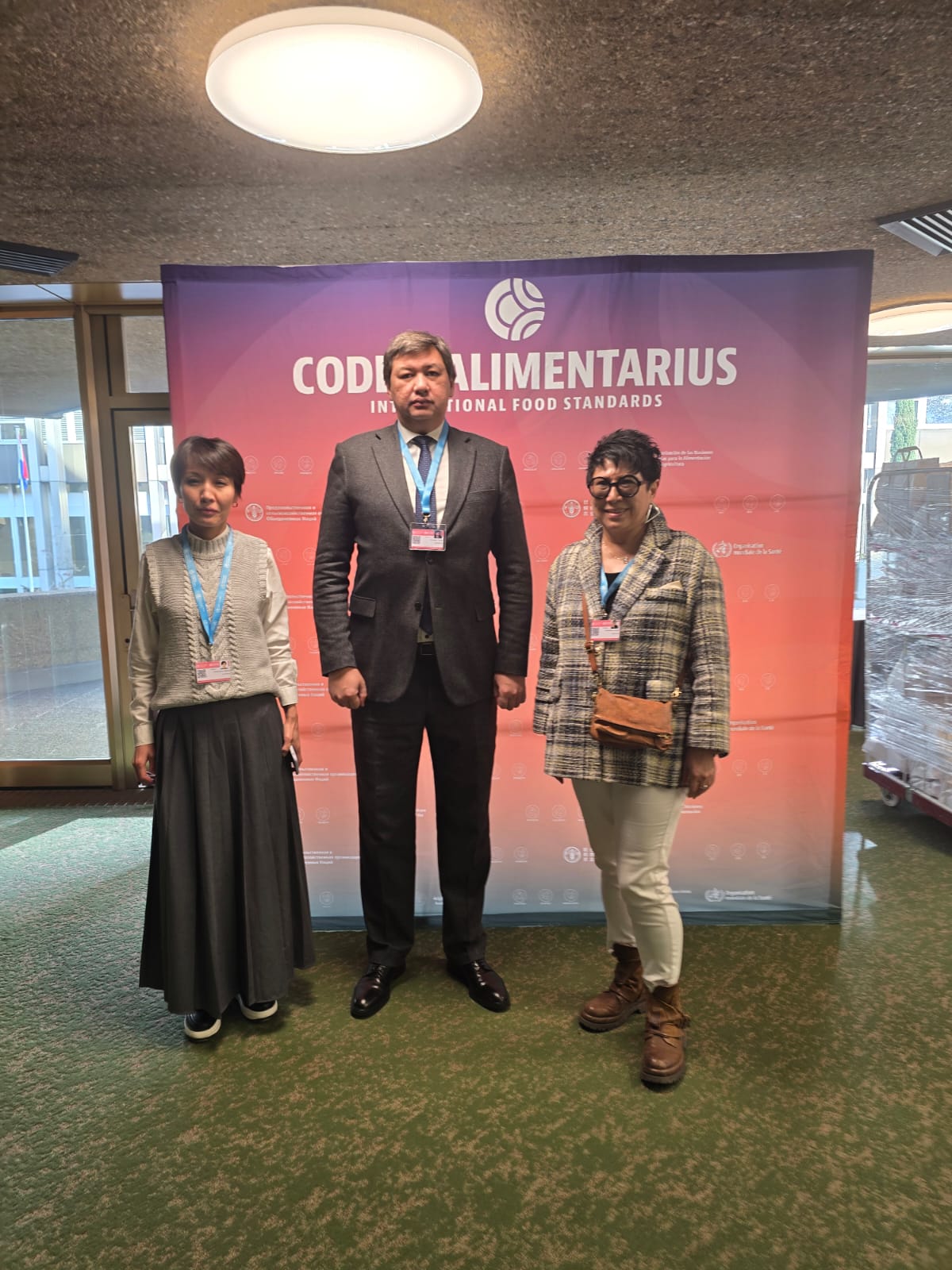
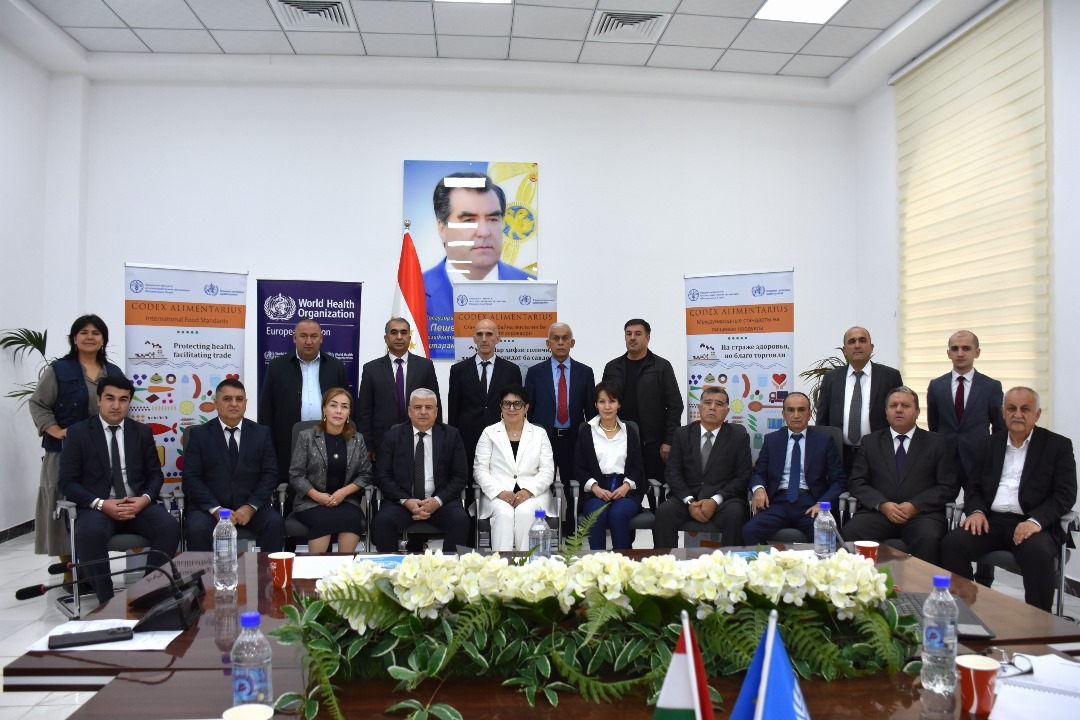
November, 18-20, 2024, the National Workshop “Launch of the FAO/WHO Codex Alimentarius Trust Fund Project. Priority Committees. Codex Electronic Tools” was held in Dushanbe. This is the first workshop marking the start of the FAO/WHO Codex Trust Fund Project. Welcoming speeches were made by the representatives of the Ministry of Health and Social Protection Said Davlatzoda, WHO Country Office Umeda Sadykova, WHO expert Nailya Karsybekova.
The workshop were attended by key stakeholders: the Ministry of Health and Social Protection, the Ministry of Agriculture, the Ministry of Economy and Trade, the Committee for Food Security under the Government of the Republic of Tajikistan, the Republican Nutrition Center, the “TajikStandard” Agency, and food producers.
At the workshop, Professor Karsybekova N. spoke about the Codex Alimentarius Commission and the role of the FAO/WHO Codex Alimentarius Trust Fund in capacity building of countries, and CCP Kazakhstan Tolysbayeva Zh. shared information about the functional responsibilities of the CCP and her professional experience. Then CCP Tajikistan Khalimov O. told the audience about the general structure of the Trust Fund project in the Republic of Tajikistan and presented the action plan. The workshop participants shared their vision of the implementation of the action plan and, after active discussions, made their own adjustments. As a result, a draft Roadmap was developed.
The second day of the workshop was devoted to the subsidiary bodies of the Codex Alimentarius Commission and the specifics of working in them. CCP Tajikistan Khalimov O. presented the justification for choosing the priority of Codex subsidiary bodies for Tajikistan. An important issue for the participants was familiarization with the CAC Procedural Manual of the Codex Alimentarius Commission. Theoretical provisions for working with Codex online tools were presented. After that, a practical session was held, during which the participants demonstrated their skills in registering and providing information in a specially created training electronic working group.
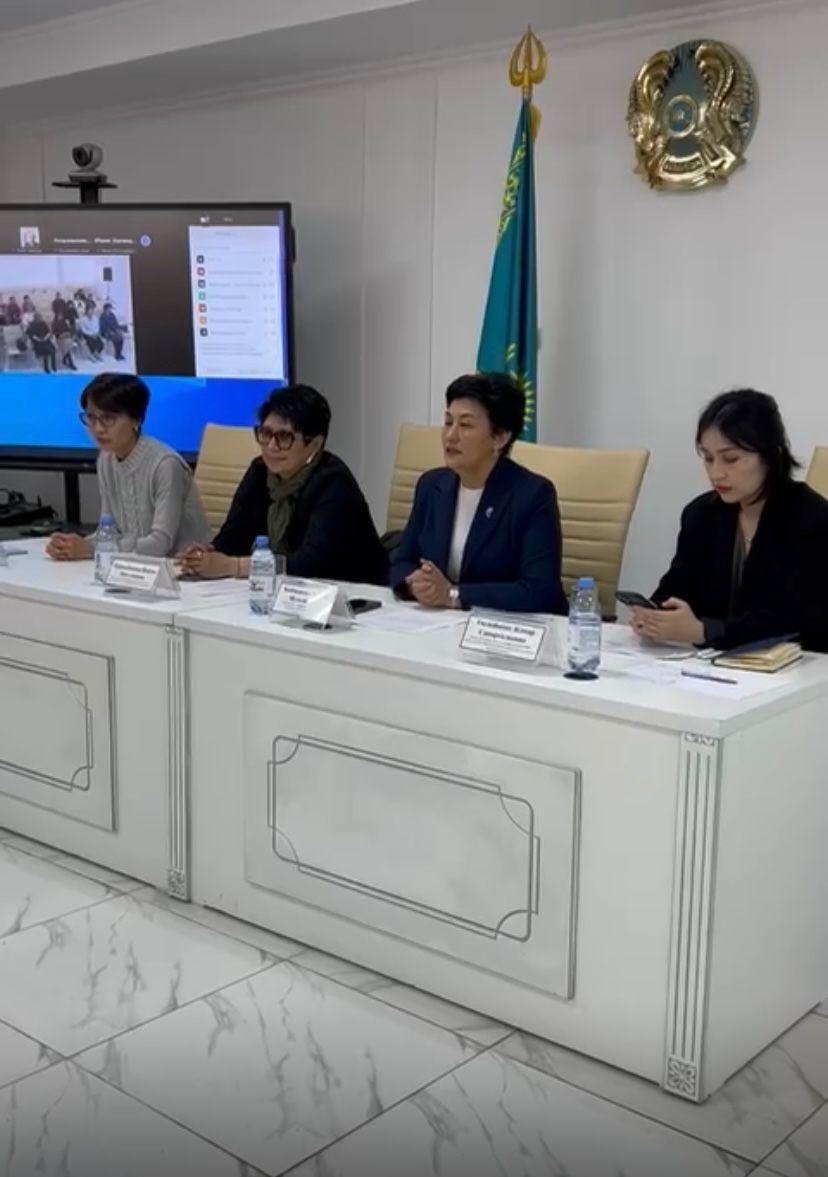
November, 2024. The Codex Alimentarius Team participated as speakers in seminars in Almaty, Oskemen, Aktobe, and Astana with the technical support of the WHO country office and the Ministry of Healthcare of the Republic of Kazakhstan. The mode of the seminars was physical participation and online.
The head of the WHO country office, Skender Syla, and the Chairperson of the Board of the Republican State Enterprise on the Right of Economic Management “National Center for Public Health” of the Ministry of Healthcare of the Republic of Kazakhstan, A.Yesmagambetova, made a video welcome address to the participants.
The seminar participants were represented by business operators and territorial divisions of the Committee for Sanitary and Epidemiological Control of the MoH of Kazakhstan. The issue of excessive consumption of table salt, the development of non-communicable diseases (NCDs), the current state in the Republic of Kazakhstan, measures recommended by WHO to reduce the consumption of table salt and international practice, proposed steps by government agencies and the private manufacturing sector were discussed.
A practical session was held, where participants developed actions to reduce salt consumption in food production, changes to regulations/ legislation acts and events to raise awareness among the general population, private food sector.
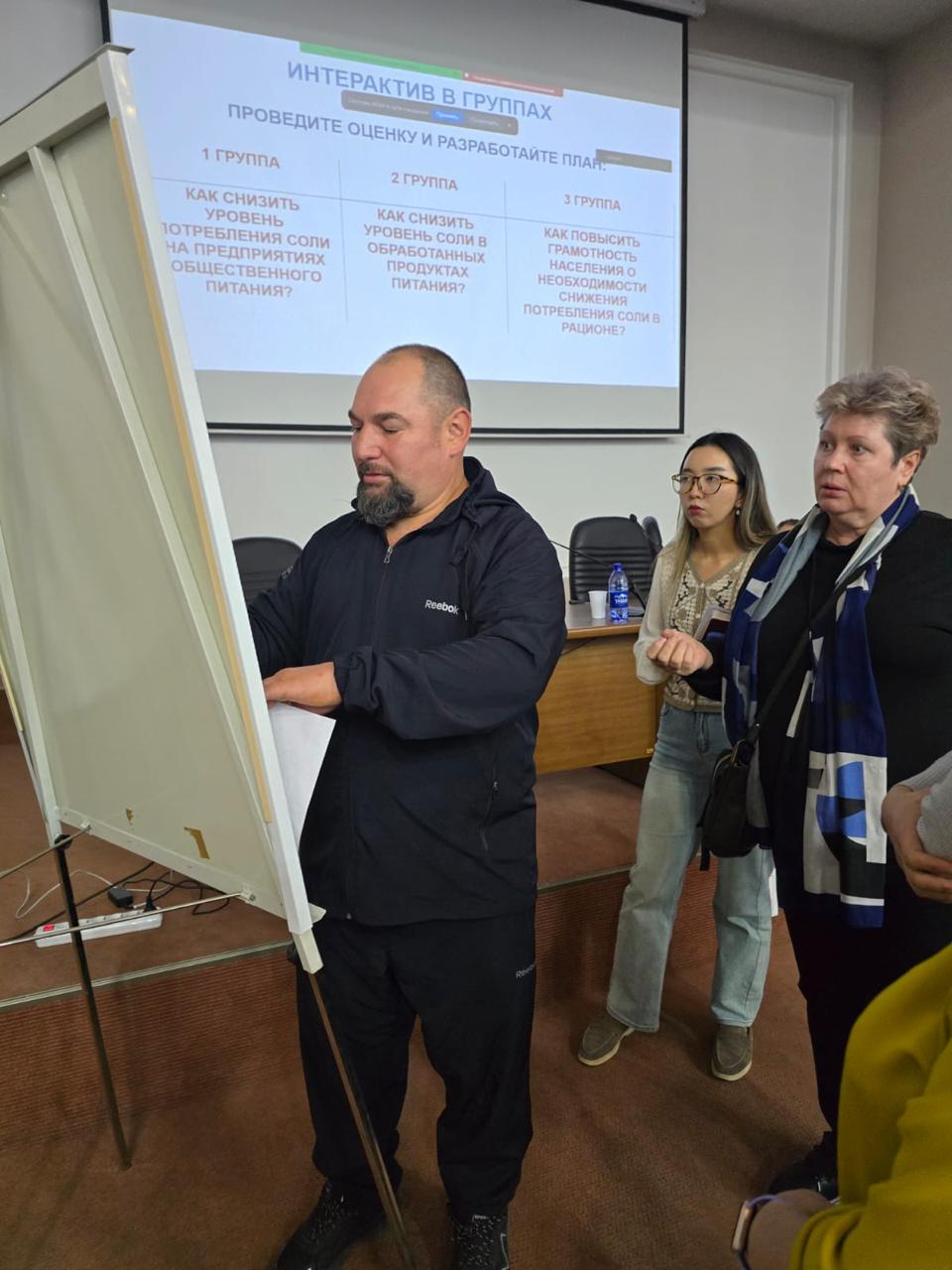
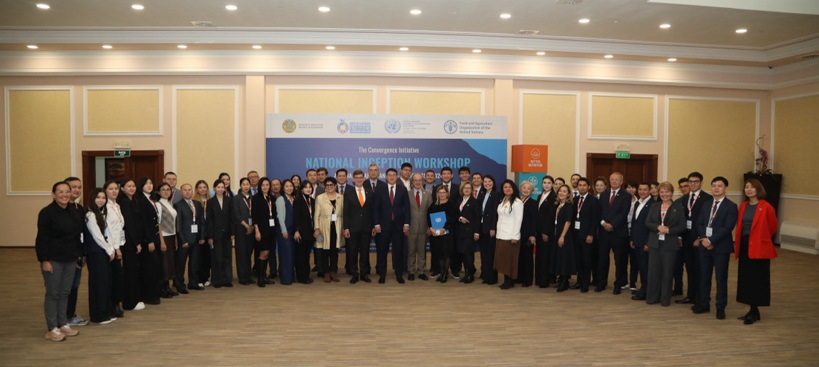
October 23-24, 2024, the National workshop “Convergence Initiative – Strengthening synergetic action between food systems transformation and climate action agendas in Kazakhstan” was held. The workshop was opened by the Vice Minister of Agriculture of the Republic of Kazakhstan, Yerbol Taszhurekov.
Opening remarks were made by National Food Systems Coordinator Nazgul Khatepova, Director of the UN Food Systems Coordination Centre Stefanos Fotiou, Co-Chair of the UN Food Systems Coalition for Europe and Central Asia Raimund Jehle and representative of the FAO country office Zhanyl Bozaeva.
The Convergence Initiative aims to support national efforts to advance the alignment between the “food systems transformation (FST)” and “climate action (CA)” agendas to enable governments and stakeholders at the national level to strengthen synergetic action that will simultaneously support the achievement of the SDGs and the Paris Climate Agreement.
Kazakhstan is selected as the first pilot country in Europe and Central Asia, providing an opportunity to capitalize on the important strides and progress made on the food systems and climate action agendas. Through these actions, important issues to be addressed as part of sustainably transforming food systems while protecting natural resources and overcoming climate challenges include improving water management, addressing land degradation, and fostering inclusive policies that empower vulnerable groups.
The workshop participants discussed and developed a draft Roadmap of practical next steps and directions to improve alignment in order to address the identified gaps.
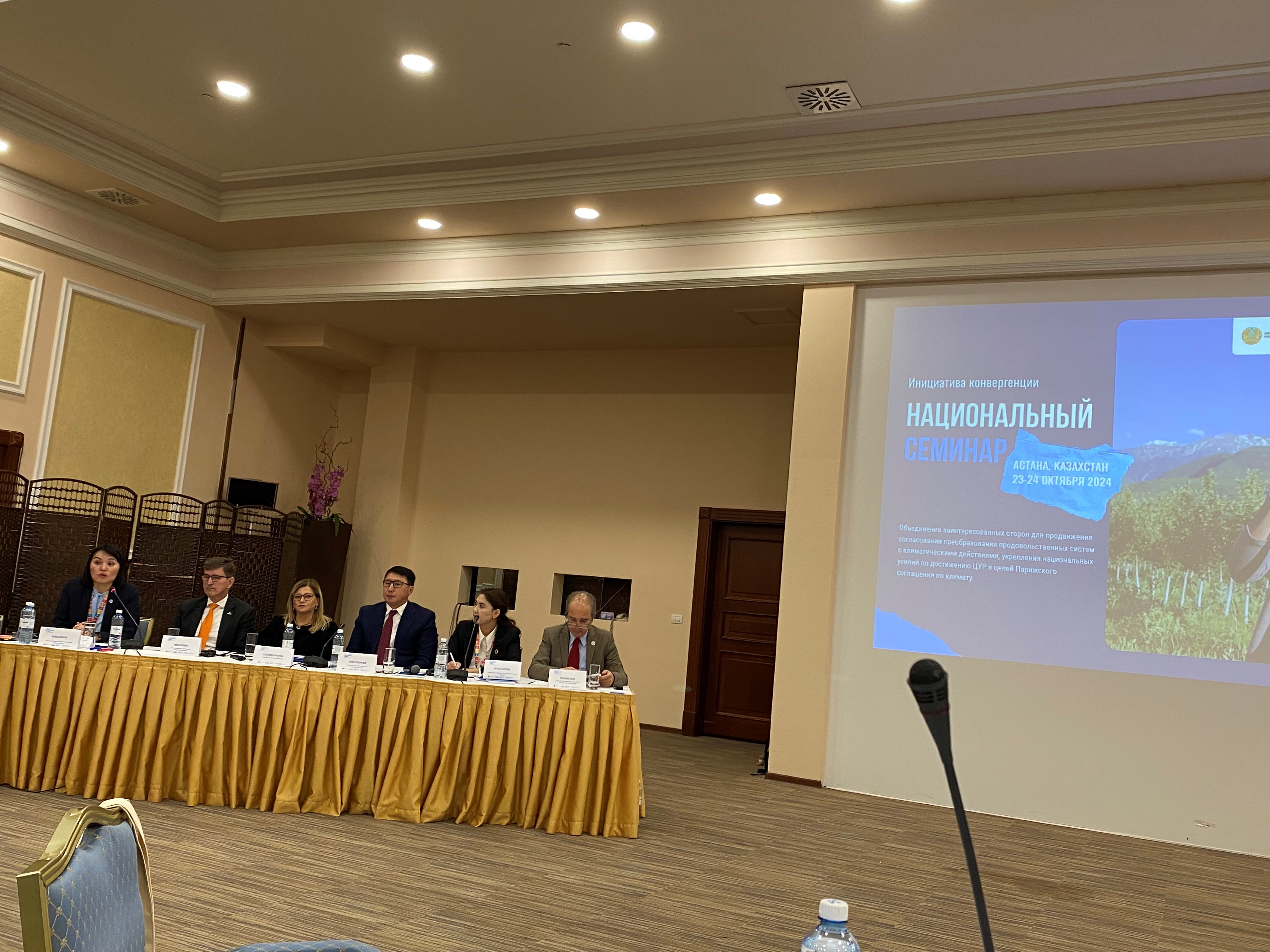
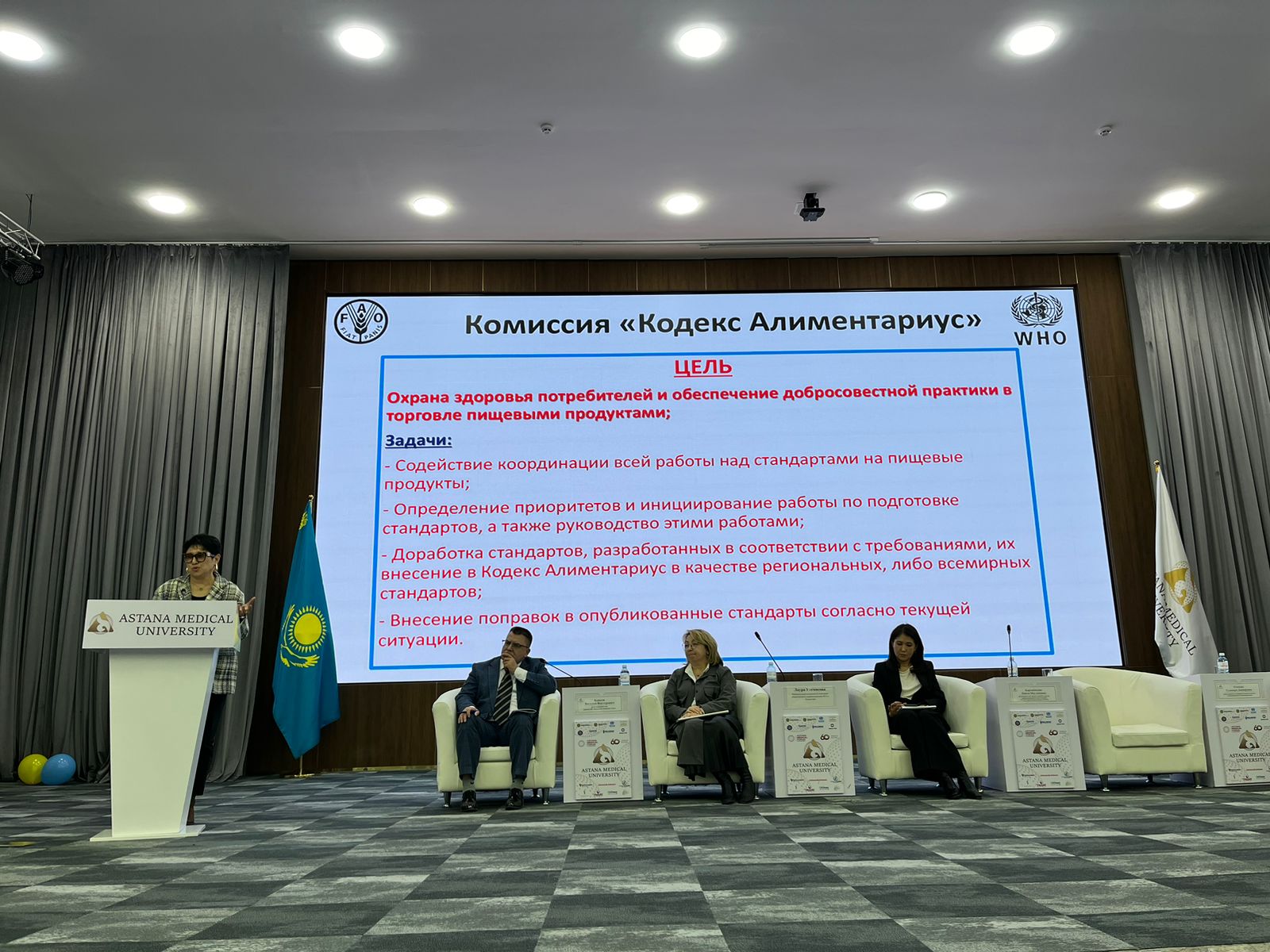
On October 23-24, 2024, Astana Medical University, with the WHO support, held a scientific and practical conference "Preventive Medicine - Vector of High-Quality and Healthy Longevity: Conference 2024", dedicated to the 60th anniversary of the Astana Medical University and dedicated to the day of memory of the first graduate of the university, Academician Dalenov.
The conference was attended by the Head of the WHO country office Skender Syla, academician of the National Academy of Sciences of the Republic of Kazakhstan V.V. Benberin, the Russian Gerontological Scientific and Clinical Center, faculty, students, master's students, and doctoral students of the University.
The plenary session "Development of Preventive Medicine: Challenges and Opportunities" discussed the WHO nutrition policy, national monitoring of healthy lifestyles, innovative approaches to disease prevention, and the development of integrative medicine in Kazakhstan. Doctor of Medical Sciences, Professor, National Coordinator of the Codex Alimentarius Karsybekova N. M. reported on the work of the Codex Alimentarius Commission and Kazakhstan's experience.
Active discussions took place during the plenary sessions “A Holistic Approach to Prevention: Family, Age and Personalized Medicine”, “Virtual Health Solutions: Prevention and Lifestyle”, “Nutrition and Rehabilitation: Strategies for Improving Quality of Life”
Active discussions took place during the plenary sessions “A Holistic Approach to Prevention: Family, Age and Personalized Medicine”, “Virtual Health Solutions: Prevention and Lifestyle”, “Nutrition and Rehabilitation: Strategies for Improving Quality of Life”
Following the conference, a resolution was adopted to add the specialty of “Preventive (Integrative) Medicine” to the current regulatory legal acts and introduce the position of “Preventive (Integrative) Medicine Doctor”, provide for the allocation of grants for research on preventive medicine and nutrition, improving the prevention of NCDs, and strengthening educational components in preventive medicine.
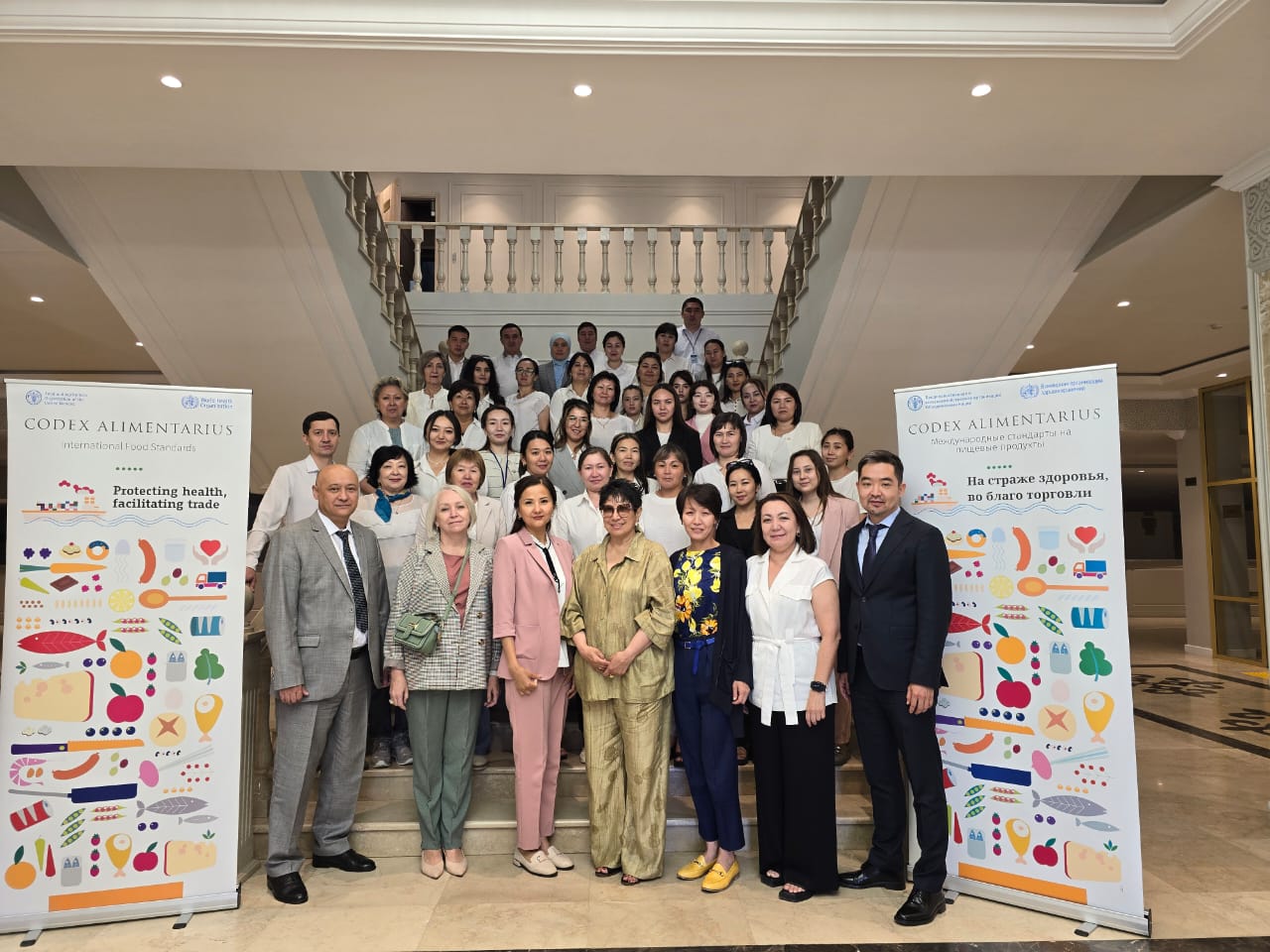
The final seminar in the chain of seminars was held in the regions of Kazakhstan on the topic “ Priority food safety issues ” was held on June 26-27, 2024 in Uralsk, West-Kazakhstan region. Taking into account the importance and relevance of the topic of the event, the Department of Sanitary and Epidemiological Control of the West Kazakhstan Region selected the venue of the seminar in the new luxury conference hall of the “Atameken Palace of Arts”. The seminar was attended by 48 person from the employees of the territorial divisions of the Committee for Sanitary and Epidemiological Control of the Ministry of Health of the Republic of Kazakhstan, the Committee for Veterinary Control and Surveillance of the Ministry of Agriculture of Kazakhstan, the RSE “National Center of Expertise”, the National Chamber of Entrepreneurs “Atameken” and food industry enterprises of the West Kazakhstan region.
In frame the presentations of the reports, discussions with the audience arose on the use of veterinary drugs, compliance of food enterprises' personnel with hygiene standards and commodity neighboring standards. Current food safety issues faced by the participants in the course of their activities were also discussed.
The participants unanimously noted the importance of holding such kind of seminars to improve competencies and their involvement in the development of international cooperation in food safety.
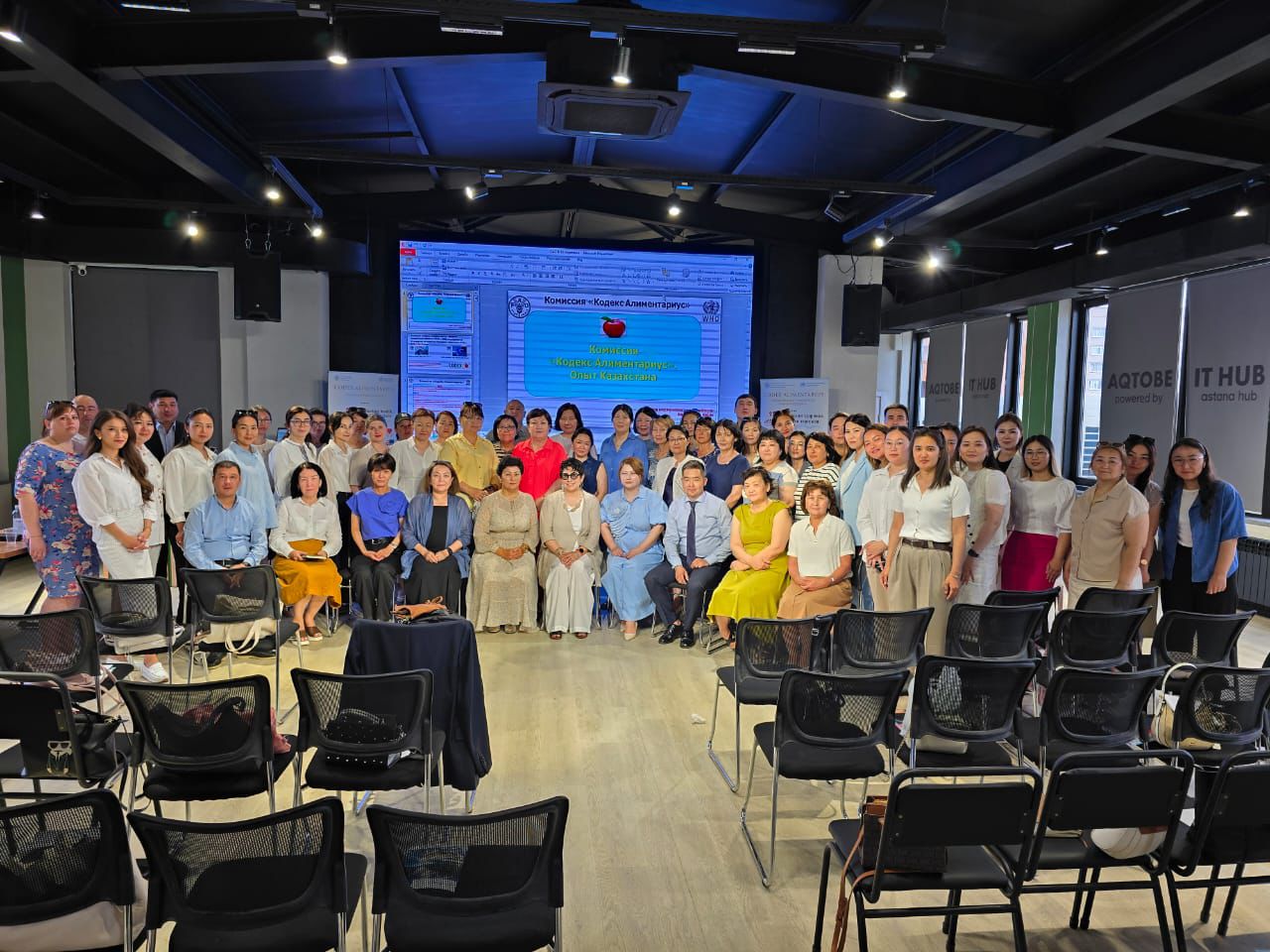
June 19-20, 2024, a training workshop on food safety was held for the west region of the country in Aktobe city. Total 55 participants were registered from Aktobe, Atyrau and Mangystau oblasts.
The head of the Department of the Committee for Sanitary and Epidemiological Control of the Ministry of Health of the Republic of Kazakhstan for the Aktobe region, R. M. Koyshanova, gave a welcoming speech, wishing fruitful work. The modern spacious hall gathered representatives of the Sanitary and Epidemiological Control Committee of the MoH of RK, the Veterinary Control and Supervision Committee of the MinAgri, "National Center of Expertise" of the CSEC of the Ministry of Health of the Republic of Kazakhstan, food facilities.
The topics covered by the lecturers allowed the audience from different fields to be interested in both general current issues, in particular, Codex Alimentarius standards and practical aspects of participation in their development, the One Health approach, as well as more specific ones, including the implementation of HACCP principles, the strategy for limiting the consumption of trans fats, and synthetic dyes.
A survey of participants showed that there is a need to conduct such workshops, and topics were proposed.
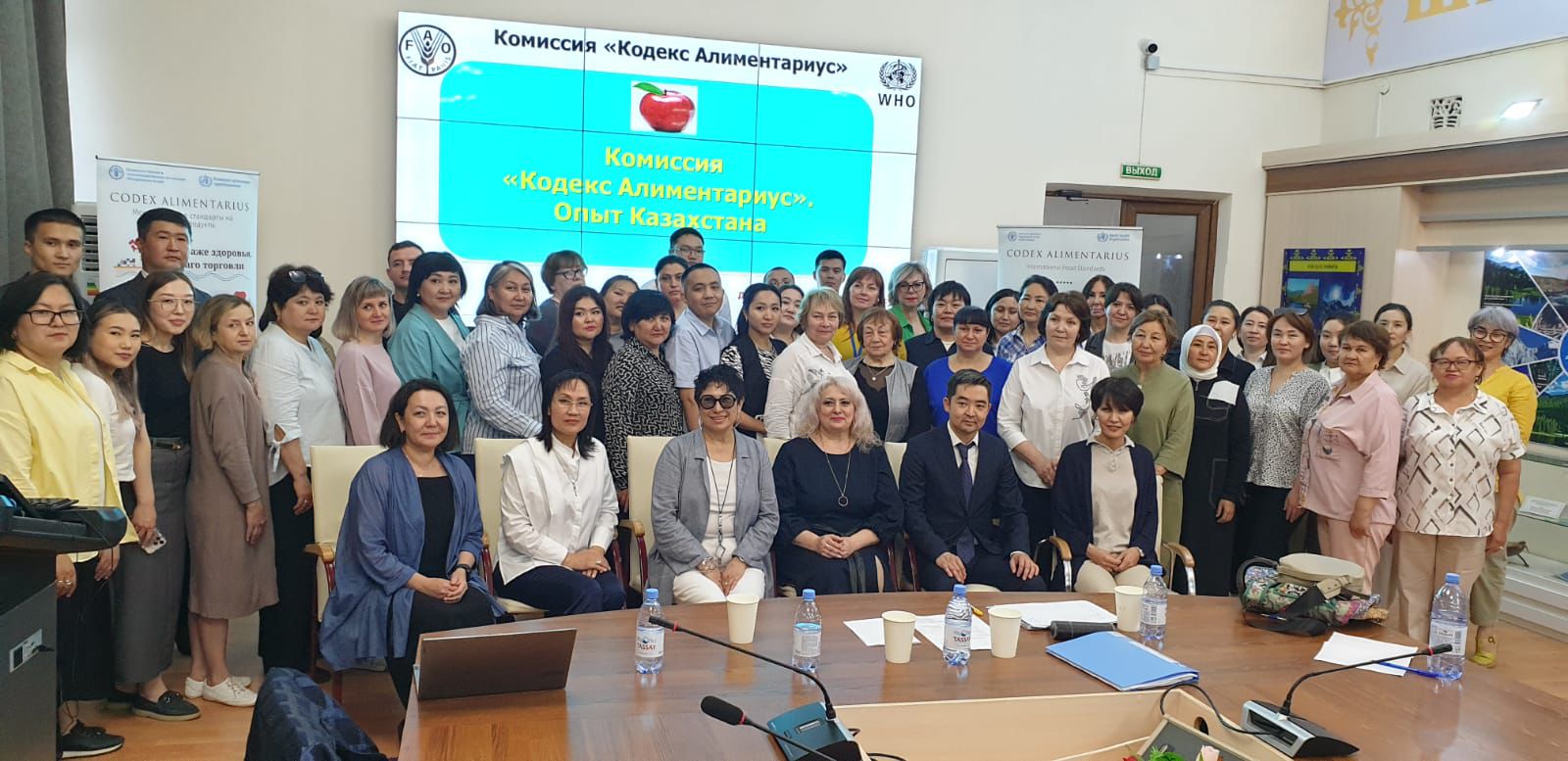
The next venue for a series of cluster seminars on the topic “Actual issues of food safety” was the city of Ust-Kamenogorsk. Representatives of the territorial divisions of the Committee for Sanitary and Epidemiological Control of the Ministry of Health (hereinafter – CSEC MH) and the Committee for Veterinary Control and Surveillance of the Ministry of Agriculture of the Republic of Kazakhstan, the RSE on the REM "National Center of Expertise", the RSE on the REM "Republican Veterinary Laboratory", National Chamber of Entrepreneurs “Atameken”, as well as food industry enterprises of the East Kazakhstan and Abay regions were invited to the event. A total of 60 people participated.
The participants showed high interest in the presented reports. The issues of application of Codex Alimentarius standards in Kazakhstan, implementation of state control, implementation of HACCP, antimicrobial resistance, and regulation of trans fats were vigorously discussed. As a result, some entrepreneurs and employees of the CSEC MH in the East Kazakhstan region expressed an intention to join the group of national experts on work in the specialized committees of the Codex Alimentarius Commission. Requests were also expressed wishes about the need to hold similar seminars on other important aspects of food safety.
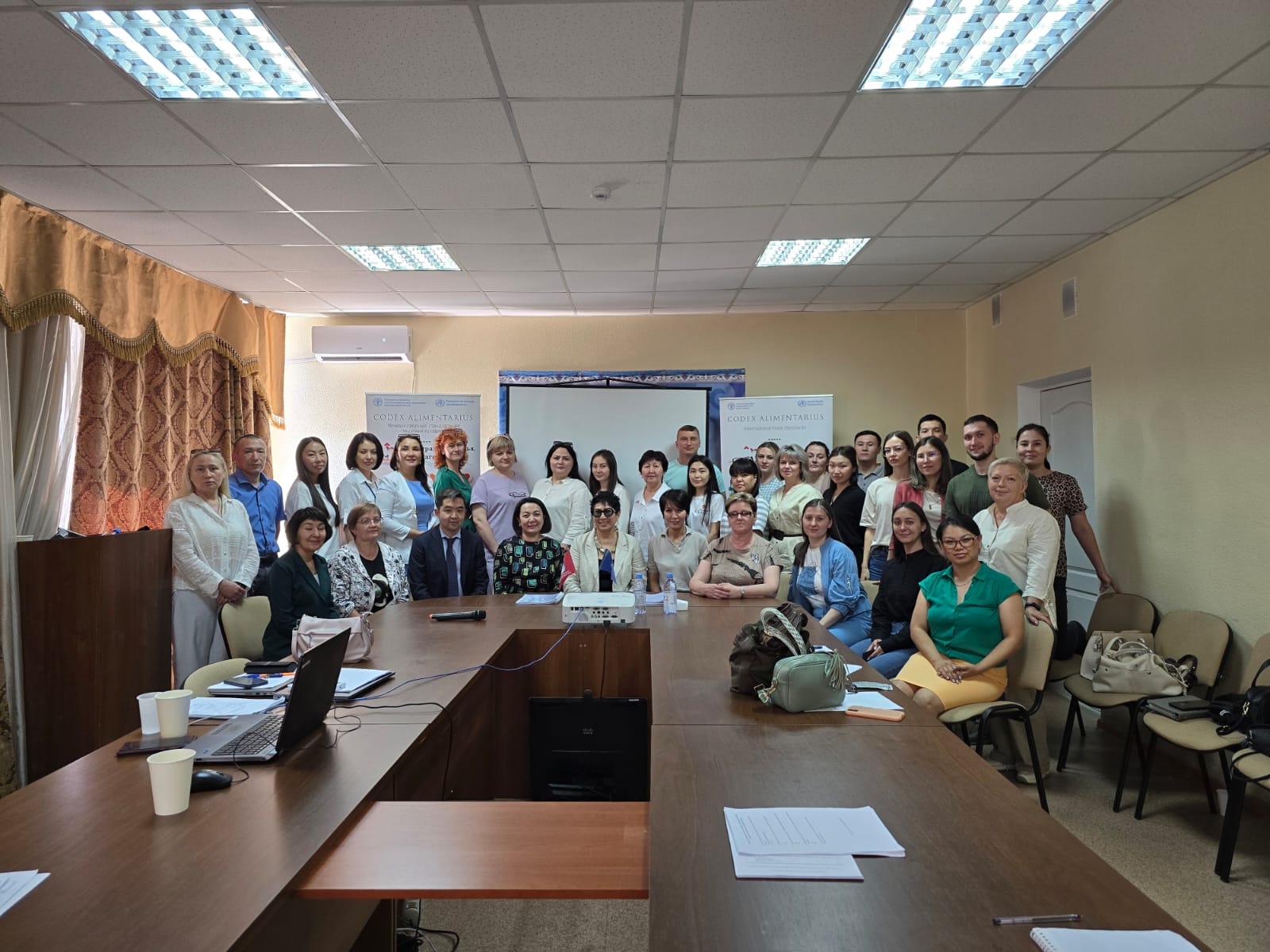
June 5-6, 2024, a regional workshop “Priority issues of food safety” was held in Kostanay for interested organizations and departments. Representatives of the territorial departments of sanitary and epidemiological control of the Ministry of Healthcare of RK, the veterinary control and surveillance inspection of the Ministry of Agriculture of RK, the branch of the "National Center of Expertise" for the Kostanay region of the CSEC of the Ministry of Healthcare of the Republic of Kazakhstan, food manufacturers took part in the workshop. The total number is 54 participants.
According to the agenda, food safety issues were discussed, including Codex Alimentarius standards, HACCP, food origin antimicrobial resistance. As usual, practical interest was aroused by the discussion of the trans fats impact on health, the level of their consumption by modern human, and the policy of limiting the use of trans fats. Also, a heated discussion took place after the report on new food sources, which is also a document for consideration within the framework of the Codex Alimentarius Commission.
Participants completed the questionnaire on the quality of the workshop, and an analysis will be conducted at the end of all planned workshops.
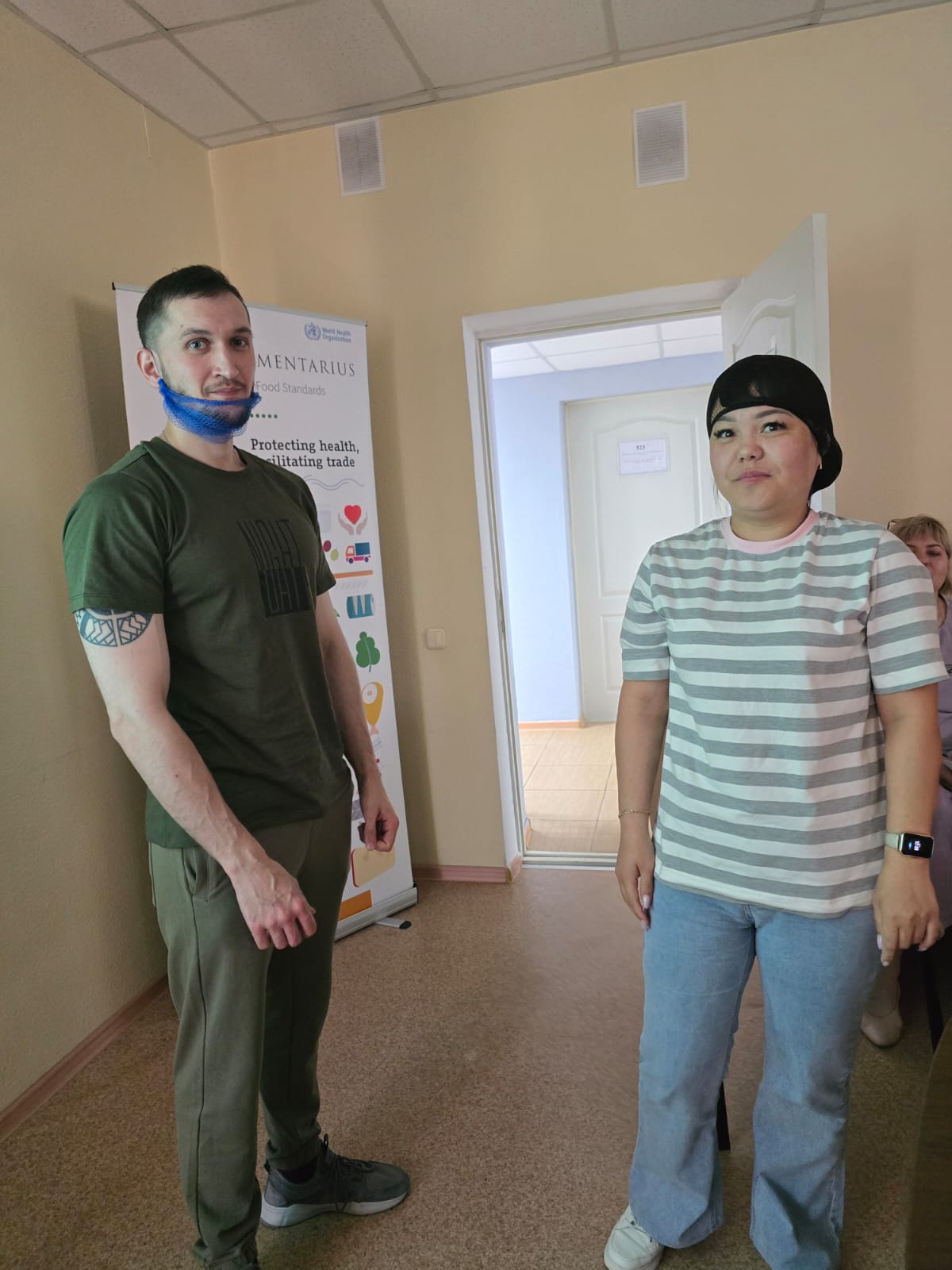
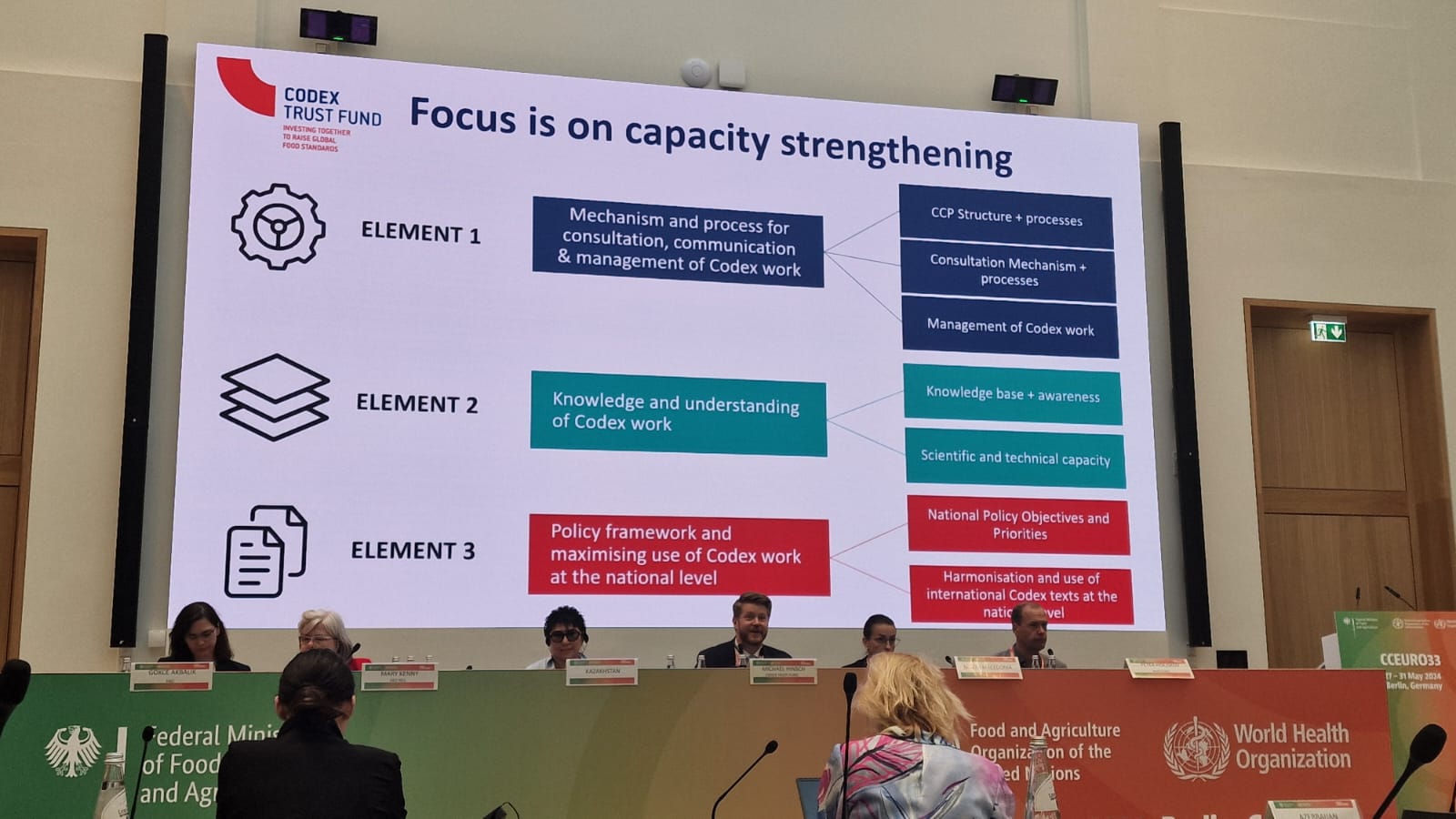
The 33rd session of the FAO/WHO Coordinating Committee for Europe of the Codex Alimentarius Commission (hereinafter – CCEURO33) was held in Berlin (Germany). Participants included delegates from 32 countries in the European Region, four Members countries from other regions, two observer organizations, as well as the the Food and Agriculture Organization of the United Nations (FAO) and the World Health Organization (WHO).
During the session, the following issues were considered: the “One Health” approach and food safety – Challenges and Potential; Matters arising from the Codex Alimentarius Commission and Codex subsidiary bodies; FAO/WHO work in the Region; Food safety and quality issues in the region; Use and Impact of Codex Standards in the Region.
Also one of the issues on the agenda Codex work relevant to the Region. As part of this issue, an agreement was reached on the need to create an electronic working group to develop Food-Based Nutrition Guidelines for the European region. The working group was chaired by Germany, co-chaired by Spain, Türkiye and Kazakhstan.
In addition, progress in the implementation of the Codex Strategic Plan 2020-2025: Implementation in the European region was discussed. On this issue, Kazakhstan was acting as a facilitator of the middle income countries (MIC) group to discuss draft priority goal 4 “Facilitate the participation of all Codex Members throughout the standard setting process” on the types of activities to be implemented in the European Region in 2024-2025
The contribution and participation of CCEURO in the development of the draft Codex Strategic Plan 2020-2025: Implementation in the European region.
On May 30, a side event entitled “Codex Trust Fund-2 Perspectives from beneficiary countries and introduction of the CTF2 project output repository” was held. Kazakhstan made a report on the results and successes of the implementation of the Trust Fund project in Kazakhstan. An event “Leveraging national data and information for international food standards” was also held.
The work of the Federal Republic of Germany during the first term of its chairmanship was highly appreciated at CCEURO33 and the powers of the Federal Republic of Germany as chairman were extended for another two-years term.
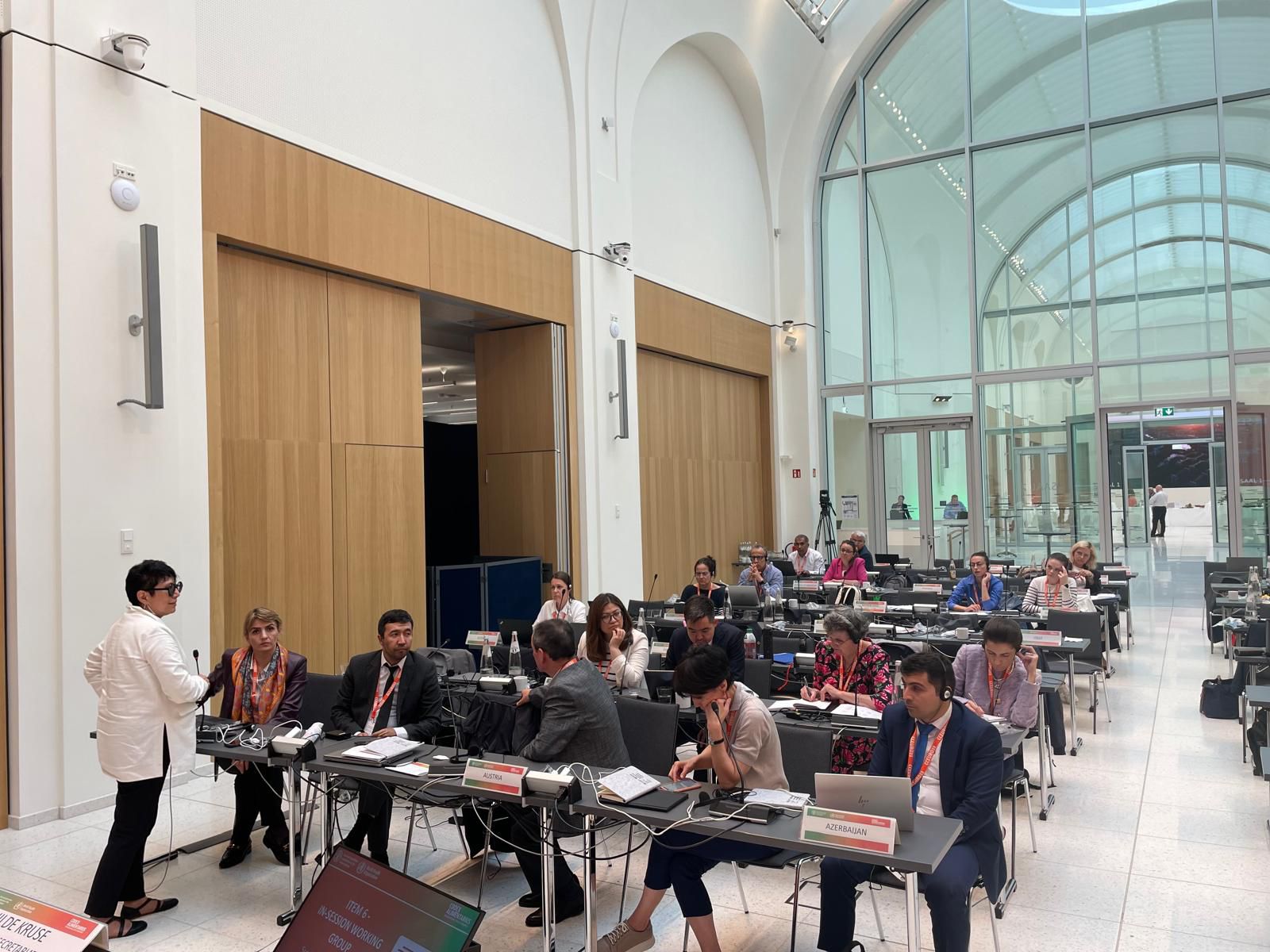

May 14-15, 2024, a workshop was held in Pavlodar. Participants were presented by employees of the territorial divisions of the Committee for Sanitarian and Epidemiological Control of the Ministry of Healthcare of RK, the branch of the "National Center of Expertise", food producers of the Pavlodar region, NChE "Atameken" and universities (Pavlodar State University named after Toraigyrov). 45 people took part.
The speakers spoke on issues of the Codex Alimentarius Commission, their subsidiary bodies, antimicrobial resistance and the One Health approach, HACCP principles, and outbreaks of foodborne diseases.
The workshop was attended by domestic food producers, who also shared their experience and opinions regarding the HACCP principles. In particular, the “Rubikom” enterprise, which produces sausages and semi-finished products, spoke about the work done to implement the HACCP principles. Advisor to the General Director of the “Abay” meat processing enterprise said that HACCP is, first of all, self-control, when the manufacturer can manage his work process, correctly distribute the work process and, most importantly, realize his responsibility to the consumer for the safety of his products. Moreover, HACCP is extremely similar to the requirements for Halal products. It was emphasized that the introduction of HACCP principles guarantees the food safety of manufactured products, and also significantly increases the enterprise’ export potential.
According to established tradition, the participants appreciated the quality of the workshop and expressed their wishes on topics that are interesting to them and necessary in their work activities. Analysis of the responses revealed the participants’ satisfaction with the knowledge gained during the workshop, the informative availability of materials, and expressed their wishes to conduct similar workshops on a regular basis.
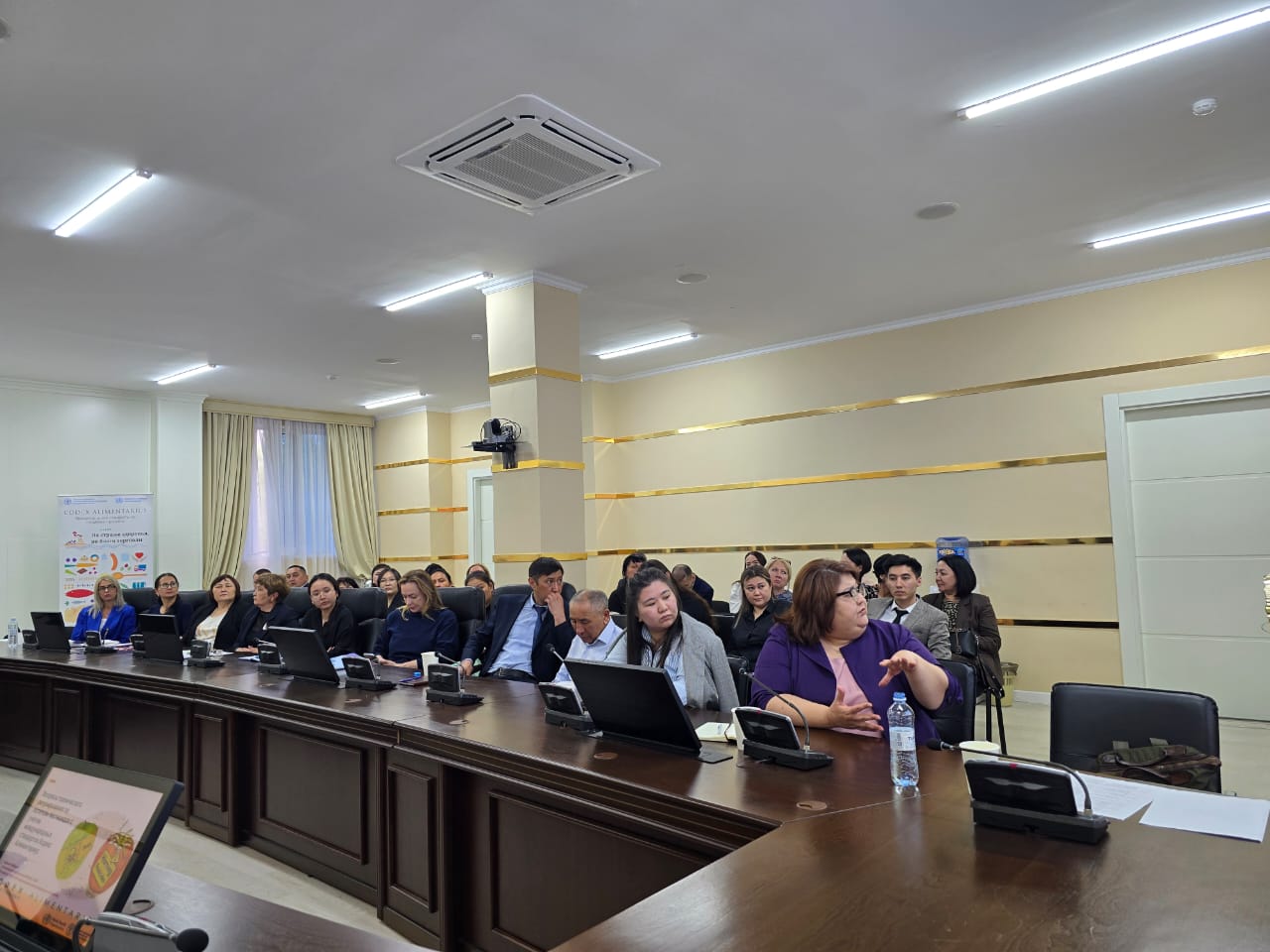

As part of the planned schedule of seminars, a seminar on the topic “Actual issues of food safety” was held in Astana. The participants of the seminar were representatives of services and departments in the field of food safety and entrepreneurs from Astana, Akmola, Ulytau and Karaganda regions. As a whole, 56 people took part.
According to the participants' feedback, the seminar was very relevant and productive. The issue of control the maximum residue levels of pesticides in the legislation of Kazakhstan arose particular interest among the seminar participants. The issues of registration and forecasting of food poisonings, cases of food poisoning known to the participants also arouse heated discussion. The relevance of the presentation on new food sources was noted.
At the end of the seminar, a questioning of participants was conducted to determine the effectiveness of the seminar. Based on the results of the questioning , a high rating was given, and wishes were expressed to hold similar seminars on a regular basis.
As the seminar participants noted, the high-quality representation of the audience was valuableюIt is allowed for a discussion of the topics raised from various professional positions/points of view.